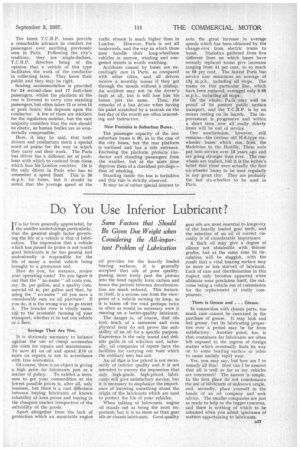Do You Use Inferior Lubricant?
Page 33

If you've noticed an error in this article please click here to report it so we can fix it.
Some Factors that Should Be Given Due Weight when Considering the All-important Problem of Lubrication
IT is far from generally appreciated, by 1 the smaller undertakings particularly, that the greatest single factor governing the life of a vehicle is that of lubrication. The impression that a vehicle which has passed its prime is not worth good lubricants is far too general and undoubtedly is responsible for the life of many a useful vehicle being brought to a premature end.
How -do you, for instance, review your operating costs? Do you figure it out that the " no-name " oil costs you, say, 2s. per gallon, and a quality commercial oil 4s. per gallon and that, by using the " no-name" oil you save a considerable sum on oil purchase? If you do, it is the wrong way to go about it. The broader view is vitally essential to the economic running of your transport, whether it be but one vehicle of a fleet.
Savings That Are Not.
It is obviously necessary to balance against the use 'of' cheap accessories the costs for repairs and maintenance. To save ZI on oil and spend £10 or more on repairs is not in accordance with true economics. '
Of course, there is no object in giving a high price for lubricants just as a matter of policy. To exhibit a keenness to get your commodities at the lowest possible prices is, after all, only business, but there is a vast difference between buying lubricants of known reliability at keen prices and buying in the cheapest market irrespective of the suitability of the goods.
Apart altogether from the lack of protection which an unsuitable engine
oil provides for the heavily loaded bearing surfaces, it is generally accepted that oils of poor quality, passing more freely past the pistons into the head rapidly form carbon and hence the periods between decarbonization are much reduced. This feature, in itself, is a serious one from the viewpoint of a vehicle earning its keep, as it is taken off the road perhaps twice as often as would be necessary were it running on a better7quality 'lubricant,
The danger is; of course, that oils lookmuch of a sameness and even physical tests do not, prove the suitability of an oil for a specific purpose. Experience is the only, sound and definite guide in oil selection and naturally, oil companies of repute have the facilities for carrying out tests which the ordinary user has not.
An oil that is low priced is not necessarily of inferior quality and it is not intended to convey the impression that only high-grade, high-priced lubricants will give satisfactory service, but it is necessary to emphasize the importance of knowing something about the origin of the lubricants which arc used to protect the life of your vehicles.
When talking of lubricants, engine oil stands out as being the most important, but it is no more so than gear oils or chassis lubricants. Good-quality gear oils are most essential to longevity of the heavily loaded gear teeth, and the selection of an oil of correct viscosity is of considerable importance.
A thick oil may give a degree of silence not obtainable with thinner grades, but at the same time its circulation will be sluggish, with the result that a vital bearing surface may be more or less starved of lubricant. Lack of care and discrimination in this respect only becomes apparent when ultimate wear proclaims itself, the out-. come being a vehicle out of commission for the replacement of costly coin Orients.
There is Grease and . . . Giease.
In connection with chassis parts, too much care cannot be exercised in the purchase of grease. It may look and feel greasy, hut its lubricating properties over a period may be far from satisfactory. Another point, too, is that containers for lubricants are often left exposed to the ingress of foreign matter which eventually finds its way on to some bearing surface or other to cause unduly rapid wear.
Yes, you may say, but how am I to remedy all this? How can I be assured that all is 'well so far as my vehicles are concerned? The answer is simple_ In the first place tiO not countenance the use of lubricants of unknown origin, and, secondly, place yourself in the hands of an oil company and seek advice. The smaller companies are just as ready to help as the bigger concerns, and there is nothing of which to be ashamed when you admit ignorance of matters appertaining to lubricants,




































































